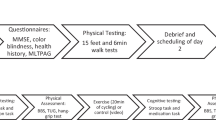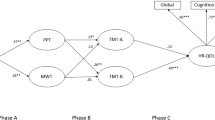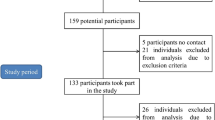Abstract
Cardiovascular endurance and muscular fitness seem to impact specific cognitive components in older females. However, it remains uncertain whether these relate to executive functions or if these correlations are limited to specific physical fitness indicators. This study aimed to determine the association between specific physical fitness components and executive functions in community-dwelling older females. Thirty-five cognitively healthy community-dwelling older females (71.5 ± 5.7 years) underwent a series of physical fitness tests. These included the handgrip strength test (HGT), the 6-min walk test (6MWT), the 8-foot up-and-go test (8FUGT), and the chair stand test (CST). Participants also completed trail A and trail B of the cognitive trail making test. Results showed that trail B reaction time had a negative association with both HGT (r = − 0.502; p = 0.002) and 6MWT (r = − 0.543; p < 0.001). Together, the HGT and 6MWT results explained 39% of the variation in trail B reaction times: HGT accounted for 18% and 6MWT for 21%. Better scores on the 6MWT and HGT—but not on the 8FUGT and CST—correlated with enhanced executive function in cognitively healthy community-dwelling older females. The results of this study underscore the importance of specific physical assessments, like the 6MWT and HGT, as potential indicators of executive function, offering targeted strategies for maintaining cognitive health in aging females.

Similar content being viewed by others
Data availability
Data from this study is available on reasonable request to said.mekari@usherbrooke.ca.
References
Lacreuse A, Raz N, Schmidtke D, Hopkins WD, Herndon JG. Age-related decline in executive function as a hallmark of cognitive ageing in primates: an overview of cognitive and neurobiological studies: aging of executive function in primates. Philos Trans R Soc B: Biol Sci. 2020; 375. https://doi.org/10.1098/rstb.2019.0618.
Best JR, Nagamatsu LS, Liu-Ambrose T. Improvements to executive function during exercise training predict maintenance of physical activity over the following year. Front Hum Neurosci. 2014;8. https://doi.org/10.3389/fnhum.2014.00353.
Dumas JA. Strategies for preventing cognitive decline in healthy older adults. Canad J Psychiatry. 2017; 62. https://doi.org/10.1177/0706743717720691.
Koran MEI, Wagener M, Hohman TJ. Sex differences in the association between AD biomarkers and cognitive decline. Brain Imaging Behav. 2017; 11. https://doi.org/10.1007/s11682-016-9523-8.
Gibson AK, Richardson VE. Living alone with cognitive impairment: findings from the national health and aging trends study. Am J Alzheimers Dis Other Demen. 2017;32. https://doi.org/10.1177/1533317516673154.
Wobrock T, Ecker UKH, Scherk H, Schneider-Axmann T, Falkai P, Gruber O. Cognitive impairment of executive function as a core symptom of schizophrenia. World J Biol Psychiatry. 2009;10. https://doi.org/10.1080/15622970701849986.
Olotu C, Lebherz L, Ascone L, Scherwath A, Kühn S, Härter M, et al. Cognitive deficits in executive and language function predict postoperative delirium. J Cardiothorac Vasc Anesth. 2023. https://doi.org/10.1053/j.jvca.2023.08.154.
Mirelman A, Herman T, Brozgol M, Dorfman M, Sprecher E, Schweiger A, et al. Executive function and falls in older adults: new findings from a five-year prospective study link fall risk to cognition. PLoS One. 2012;7. https://doi.org/10.1371/journal.pone.0040297.
Rosado-Artalejo C, Carnicero JA, Losa-Reyna J, Castillo C, Cobos-Antoranz B, Alfaro-Acha A, et al. Global performance of executive function is predictor of risk of frailty and disability in older adults. J Nutri Health Aging. 2017; 21. https://doi.org/10.1007/s12603-017-0895-2.
Wolf C, An Y, Tanaka T, Bilgel M, Gonzalez C, Triolo MK, et al. Cross-sectional and longitudinal effects of CREB1 genotypes on individual differences in memory and executive function: findings from the BLSA. Front Aging Neurosci. 2017;9. https://doi.org/10.3389/fnagi.2017.00142.
Hyodo K, Kitano N, Ueno A, Yamaguchi D, Watanabe Y, Noda T, et al. Association between intensity or accumulating pattern of physical activity and executive function in community-dwelling older adults: a cross-sectional study with compositional data analysis. Front Hum Neurosci. 2023;16. https://doi.org/10.3389/fnhum.2022.1018087.
Mekari S, Dupuy O, Martins R, Evans K, Kimmerly DS, Fraser S, et al. The effects of cardiorespiratory fitness on executive function and prefrontal oxygenation in older adults. Geroscience 2019;41. https://doi.org/10.1007/s11357-019-00128-5.
Domingos C, Pêgo JM, Santos NC. Effects of physical activity on brain function and structure in older adults: a systematic review. Behav Brain Res. 2021;402. https://doi.org/10.1016/j.bbr.2020.113061.
Erlenbach E, Mcauley E, Gothe NP. The association between light physical activity and cognition among adults: a scoping review. J Gerontol – Series Biol Sci Med Sci. 2021;76. https://doi.org/10.1093/gerona/glab013.
Haeger A, Costa AS, Schulz JB, Reetz K. Cerebral changes improved by physical activity during cognitive decline: a systematic review on MRI studies. Neuroimage Clin. 2019;23. https://doi.org/10.1016/j.nicl.2019.101933.
Spartano NL, Demissie S, Himali JJ, Dukes KA, Murabito JM, Vasan RS, et al. Accelerometer-determined physical activity and cognitive function in middle-aged and older adults from two generations of the Framingham Heart Study. Alzheimer’s and Dementia: Trans Res Clin Interv. 2019;5. https://doi.org/10.1016/j.trci.2019.08.007.
Zlatar ZZ, Godbole S, Takemoto M, Crist K, Sweet CMC, Kerr J, et al. Changes in moderate intensity physical activity are associated with better cognition in the multilevel intervention for physical activity in retirement communities (MIPARC) study. Am J Geriatric Psychiatry. 2019;27. https://doi.org/10.1016/j.jagp.2019.04.011.
Yoon DH, Lee JY, Song W. Effects of resistance exercise training on cognitive function and physical performance in cognitive frailty: a randomized controlled trial. J Nutr Health Aging. 2018;22. https://doi.org/10.1007/s12603-018-1090-9.
Sanders LMJ, Hortobágyi T, Karssemeijer EGA, Van Der Zee EA, Scherder EJA, Van Heuvelen MJG. Effects of low- and high-intensity physical exercise on physical and cognitive function in older persons with dementia: a randomized controlled trial. Alzheimers Res Ther. 2020;12. https://doi.org/10.1186/s13195-020-00597-3.
Coelho FG de M, Andrade LP, Pedroso RV, Santos-Galduroz RF, Gobbi S, Costa JLR, et al. Multimodal exercise intervention improves frontal cognitive functions and gait in Alzheimer’s disease: a controlled trial. Geriatr Gerontol Int. 2013;13. https://doi.org/10.1111/j.1447-0594.2012.00887.x.
Naderi A, Shaabani F, Esmaeili A, Salman Z, Borella E, Degens H. Effects of low and moderate acute resistance exercise on executive function in community-living older adults. Sport Exerc Perform Psychol. 2019;8. https://doi.org/10.1037/spy0000135.
Park JH. Effects of acute moderate-intensity aerobic exercise on executive function and prefrontal cortex activity in community-dwelling older adults: a single-blind, randomized controlled trial. Geriatr Gerontol Int. 2022;22. https://doi.org/10.1111/ggi.14352.
Zhao X, Huang H, Du C. Association of physical fitness with cognitive function in the community-dwelling older adults. BMC Geriatr. 2022;22. https://doi.org/10.1186/s12877-022-03564-9.
Arbuthnott K, Frank J. Trail making test, part B as a measure of executive control: validation using a set-switching paradigm. J Clin Exp Neuropsychol. 2000;22. https://doi.org/10.1076/1380-3395(200008)22:4;1-0;FT518.
Colcombe S, Kramer AF. Fitness effects on the cognitive function of older adults: a meta-analytic study. Psychol Sci. 2003;14. https://doi.org/10.1111/1467-9280.t01-1-01430.
Paul SS, Tiedemann A, Hassett LM, Ramsay E, Kirkham C, Chagpar S, et al. Validity of the Fitbit activity tracker for measuring steps in community-dwelling older adults. BMJ Open Sport Exerc Med. 2015;1. https://doi.org/10.1136/bmjsem-2015-000013.
Rasiah J, Gruneir A, Oelke ND, Estabrooks C, Holroyd-Leduc J, Cummings GG. Instruments to assess frailty in community dwelling older adults: a systematic review. Int J Nurs Stud. 2022;134. https://doi.org/10.1016/j.ijnurstu.2022.104316.
Searle SD, Mitnitski A, Gahbauer EA, Gill TM, Rockwood K. A standard procedure for creating a frailty index. BMC Geriatr. 2008;8. https://doi.org/10.1186/1471-2318-8-24.
Rikli RE, Jones CJ. Development and validation of criterion-referenced clinically relevant fitness standards for maintaining physical independence in later years. Gerontologist 2013;53. https://doi.org/10.1093/geront/gns071.
Roberts HC, Denison HJ, Martin HJ, Patel HP, Syddall H, Cooper C, et al. A review of the measurement of grip strength in clinical and epidemiological studies: towards a standardised approach. Age Ageing. 2011;40. https://doi.org/10.1093/ageing/afr051.
Tombaugh TN. Trail making test A and B: normative data stratified by age and education. Arch Clin Neuropsychol. 2004;19. https://doi.org/10.1016/S0887-6177(03)00039-8.
Bruno L. Logistic regression using the SAS system theory and application. 2019; 53.
Johnson JW, LeBreton JM. History and use of relative importance indices in organizational research. Organ Res Methods. 2004;7. https://doi.org/10.1177/1094428104266510.
Ohsugi H, Murata S, Kubo A, Hachiya M, Hirao A, Fujiwara K, et al. Verification of the correlation between cognitive function and lower limb muscle strength for the community-dwelling elderly. J Phys Ther Sci. 2014;26. https://doi.org/10.1589/jpts.26.1861.
Kose Y, Ikenaga M, Yamada Y, Morimura K, Takeda N, Ouma S, et al. Timed up and go test, atrophy of medial temporal areas and cognitive functions in community-dwelling older adults with normal cognition and mild cognitive impairment. Exp Gerontol. 2016;85. https://doi.org/10.1016/j.exger.2016.09.019.
Chen FT, Etnier JL, Chan KH, Chiu PK, Hung TM, Chang YK. Effects of exercise training interventions on executive function in older adults: a systematic review and meta-analysis. Sports Med. 2020;50. https://doi.org/10.1007/s40279-020-01292-x.
Zeng Y, Wang J, Cai X, Zhang X, Zhang J, Peng M, et al. Effects of physical activity interventions on executive function in older adults with dementia: a meta-analysis of randomized controlled trials. Geriatr Nurs (Minneap). 2023;51. https://doi.org/10.1016/j.gerinurse.2023.04.012.
Nihei S, Ogawa M, Hashimoto Y, Kikuchi N, Nakazato K, Okamoto T. Arterial stiffness and physical fitness on cognitive function in community-dwelling middle-aged and older adults. Aging Clin Exp Res. 2023;35. https://doi.org/10.1007/s40520-023-02470-3.
Liu Y, Cao X, Gu N, Yang B, Wang J, Li C. A prospective study on the association between grip strength and cognitive function among middle-aged and elderly Chinese participants. Front Aging Neurosci. 2019;11. https://doi.org/10.3389/fnagi.2019.00250.
Aggarwal NT, Wilson RS, Beck TL, Bienias JL, Bennett DA. Motor dysfunction in mild cognitive impairment and the risk of incident Alzheimer disease. Arch Neurol. 2006;63. https://doi.org/10.1001/archneur.63.12.1763.
Marzolini S, Oh P, McIlroy W, Brooks D. The effects of an aerobic and resistance exercise training program on cognition following stroke. Neurorehabil Neural Repair. 2013;27. https://doi.org/10.1177/1545968312465192.
Colcombe SJ, Kramer AF, Erickson KI, Scalf P, McAuley E, Cohen NJ, et al. Cardiovascular fitness, cortical plasticity, and aging. Proc Natl Acad Sci USA. 2004;101. https://doi.org/10.1073/pnas.0400266101.
Jonasson LS, Nyberg L, Kramer AF, Lundquist A, Riklund K, Boraxbekk CJ. Aerobic exercise intervention, cognitive performance, and brain structure: results from the physical influences on brain in aging (PHIBRA) study. Front Aging Neurosci. 2017;8. https://doi.org/10.3389/fnagi.2016.00336.
Byun K, Hyodo K, Suwabe K, Ochi G, Sakairi Y, Kato M, et al. Positive effect of acute mild exercise on executive function via arousal-related prefrontal activations: an fNIRS study. Neuroimage 2014;98. https://doi.org/10.1016/j.neuroimage.2014.04.067.
Kujach S, Byun K, Hyodo K, Suwabe K, Fukuie T, Laskowski R, et al. A transferable high-intensity intermittent exercise improves executive performance in association with dorsolateral prefrontal activation in young adults. Neuroimage 2018;169. https://doi.org/10.1016/j.neuroimage.2017.12.003.
Dupuy O, Gauthier CJ, Fraser SA, Desjardins-Crèpeau L, Desjardins M, Mekary S, et al. Higher levels of cardiovascular fitness are associated with better executive function and prefrontal oxygenation in younger and older women. Front Hum Neurosci. 2015;9. https://doi.org/10.3389/fnhum.2015.00066.
Sampaio A, Marques-Aleixo I, Seabra A, Mota J, Marques E, Carvalho J. Physical fitness in institutionalized older adults with dementia: association with cognition, functional capacity and quality of life. Aging Clin Exp Res. 2020;32. https://doi.org/10.1007/s40520-019-01445-7.
Wang R, Holsinger RMD. Exercise-induced brain-derived neurotrophic factor expression: therapeutic implications for Alzheimer’s dementia. Ageing Res Rev. 2018;48. https://doi.org/10.1016/j.arr.2018.10.002.
Herting MM, Chu X. Exercise, cognition, and the adolescent brain. Birth Defects Res. 2017;109. https://doi.org/10.1002/bdr2.1178.
Camargo EC, Weinstein G, Beiser AS, Tan ZS, Decarli C, Kelly-Hayes M, et al. Association of physical function with clinical and subclinical brain disease: the Framingham offspring study. J Alzheimer’s Dis. 2016;53. https://doi.org/10.3233/JAD-160229.
Raji MA, Kuo YF, Al Snih S, Markides KS, Peek MK, Ottenbacher KJ. Cognitive status, muscle strength, and subsequent disability in older Mexican Americans. J Am Geriatr Soc. 2005;53. https://doi.org/10.1111/j.1532-5415.2005.53457.x.
Okamoto T, Hashimoto Y. Decreases in arterial stiffness and wave reflection after isometric handgrip training are associated with improvements in cognitive function in older adults. Int J Environ Res Public Health. 2022;19. https://doi.org/10.3390/ijerph19159585.
Barha CK, Liu-Ambrose T. Exercise and the aging brain: considerations for sex differences. Brain Plasticity. 2018;4. https://doi.org/10.3233/bpl-180067.
McCarrey AC, An Y, Kitner-Triolo MH, Ferrucci L, Resnick SM. Sex differences in cognitive trajectories in clinically normal older adults. Psychol Aging. 2016;31. https://doi.org/10.1037/pag0000070.
Massy-Westropp NM, Gill TK, Taylor AW, Bohannon RW, Hill CL. Hand grip strength: age and gender stratified normative data in a population-based study. BMC Res Notes. 2011;4. https://doi.org/10.1186/1756-0500-4-127.
Acknowledgements
We are immensely grateful to the older females in Memramcook, NB, who participated in our study, lending their time and insights to profoundly shape our research. Their willingness to contribute is a testament to the vibrant spirit and collaborative nature of Memramcook’s senior community. Our heartfelt thanks go out to each participant, as well as to the local organizations who supported their involvement. This study would not have been possible without your enthusiastic and generous collaboration.
Funding
This project was supported by a CIHR Catalyst Grant—Official Language Minority Communities in Health Research (#472388).
Author information
Authors and Affiliations
Corresponding author
Ethics declarations
Conflict of interest
The authors declare no competing interests.
Additional information
Publisher's Note
Springer Nature remains neutral with regard to jurisdictional claims in published maps and institutional affiliations.
About this article
Cite this article
Ahmadi, S., Quirion, I., Faivre, P. et al. Association between physical fitness and executive functions in cognitively healthy female older adults: a cross-sectional study. GeroScience (2024). https://doi.org/10.1007/s11357-024-01188-y
Received:
Accepted:
Published:
DOI: https://doi.org/10.1007/s11357-024-01188-y




